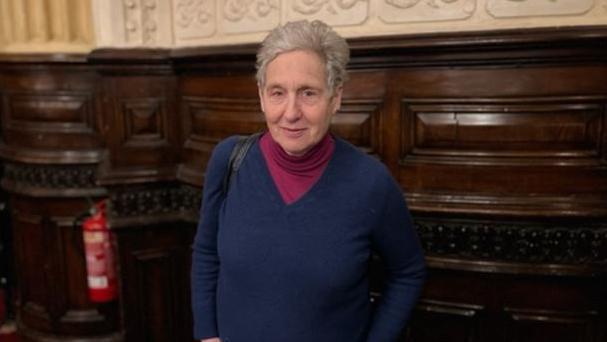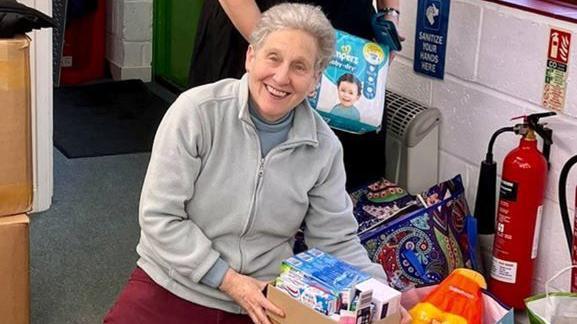'Scammers sent courier to steal £4,000'
Watch: The moment Jenny had £4,000 stolen form her on her doorstep
- Published
A victim of fraud, Jenny, has told the BBC how she used a fraud helpline to help ward off scammers.
But not before fraudsters had stolen £4,000 by sending a courier round to her house to collect her money.
Scammers are under increased pressure from the 159 fraud helpline which received 800,000 calls in its first three years of operation.
The helpline was set up by Stop Scams UK as a safe, secure way for victims to contact their banks.
'Help', intimidation then threats
Jenny was the victim of a courier fraud, external by "pretty brazen" scammers, she said.
They first pretended to be from her bank.
They knew her name, her phone number and her address and tricked her into believing they had access to her accounts, which helped convince her she was talking to a genuine bank employee.
They told her there was suspicious activity on her account, but not to worry, they were going to stop the fraud and protect her money.
Then they put her through to someone pretending to be from the police, who first promised her help to stop the fraud, then asked her for help to investigate suspected fraud at her local bank branch.
Next came intimidation, and then threats.
Jenny says she was cautioned that if she told anyone or didn't help she could face prosecution, but being community-spirited, she wanted to help anyway.
"They were on the phone the entire time that I was travelling to the bank, in the bank and travelling back from the bank so that was a pretty pressurised situation."
You can find information and advice from BBC Scam Safe week here.

Jenny was targeted by scammers who knew many of her details
Ultimately Jenny was tricked into withdrawing £4000 in cash from a branch - while the fraudsters were listening in - and as soon as she was at home she was instructed to wear gloves and examine the serial numbers on the notes as part of the elaborate, sophisticated scam.
The criminals kept up the pressure, and told Jenny the notes were fake and not to touch them.
Shortly after a courier arrived to take the money and disappeared.
When Jenny finally realised what happened she called her bank and Action Fraud, which advised her that if the scammers tried to steal more money that she should dial 159.
Just two days later, when the criminals contacted Jenny again, that's exactly what she did.
"When they phoned again, I was, I think, still in shock," she said, but dialling 159 prevented her from losing more money.
Impersonating someone's bank is key to so many frauds, which is partly why Stop Scams UK, external set up a special number three years ago to connect victims of fraud direct with their bank.
You simply dial 159, you're asked who you bank with and you're put through.
Organisers admit it's not a silver bullet - it's not a freephone number and how quickly individual banks get callers to specialist fraud advisors can vary.
But with 20 banks now signed up covering 99% of UK current account holders it's a useful tool in the fight against fraud.

As a keen volunteer the scammers were able to prey on Jenny's community spirit and use it to their advantage
'Quick and easy way for customers to contact us'
Maria Cearns, chief operating officer for the Cooperative Bank, said the lender signed up to 159 three years ago "because it provides a really quick and easy way for customers to contact us and to help us as soon as they see something that is suspicious."
"For us it's about immediate action for customers who are often in a state of panic."
She also described how in one case the banks call handlers were able to stop a fraud as it was happening in real time.
"One of our small business customers called us on the 159 line and they'd spotted some unusual transactions on their account.
"Because we prioritise speaking to those customers as quickly as possible and directly into a fraud operative we were able to immediately protect that account.
"We actually stopped that customer from losing £100,000."